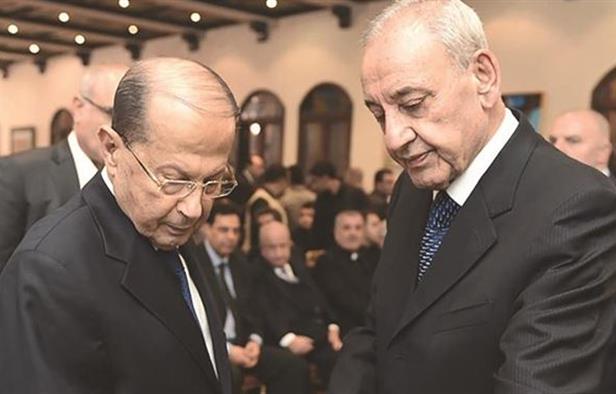Will Lebanon’s president keep parliament from ‘re-electing’ itself?
Josephine Deeb/Al-Monitor/May 02/17
To some legislators’ consternation but to no one’s real surprise, Lebanon’s parliamentary elections have been delayed yet again for at least three months.
Despite four years’ worth of extensions already, Lebanon’s parliament could keep itself in office even longer because it’s unable to break a deadlock over a proposed change in the electoral law.
On April 12, the day before parliament was scheduled to meet, President Michel Aoun invoked Article 59 of the Lebanese Constitution, which allows him to postpone a parliamentary session for one month. He may do so once during the legislative term.
Speaker Nabih Berri had called for the session to discuss extending parliament’s term, as members failed to agree on a new electoral law before a constitutional deadline expired. Aoun wants a new law implemented before elections are held for parliament, whose term ends June 21. He doesn’t want the legislature to extend its own term without elections, which he considers illegal, but he also doesn’t want a legislative vacuum. However, the constitution requires that voters be given 90 days to prepare for an election, so — because of repeated delays — one now can’t be scheduled before August at the earliest.
In a televised speech, Aoun addressed the Lebanese people, saying, “I have warned repeatedly against the extension since it is unconstitutional and will definitely not be the path toward the recovery of the government and its authorities and institutions on a sound constitutional basis.”
Minutes after Aoun announced his decision, Berri set another session for May 15. In the meantime, Lebanese political forces continue their quest to agree on an electoral law by then. Simon Abi Ramia, a member of parliament’s Change and Reform bloc, told Al-Monitor that despite differences between the parties, political forces seek to agree on a new electoral law and his political bloc will strive to prevent a parliamentary extension by all means.
Aoun wants to replace the contested 1960 Electoral Law, which is based on a majoritarian (winner-take-all) district electoral system with limited exceptions. That law allows Muslim leaders to select Christian parliament members in some constituencies. Aoun, a Maronite Christian, along with Hezbollah and the Amal Movement, are insisting on a “total proportionality” system, while others want either a hybrid law or the majoritarian system.
On the eve of April 13, the date set for the session to discuss the extension, the specter of civil war came back to haunt the Lebanese amid a sharp division of political forces and a serious threat by Christian political forces to take to the streets to prevent the session. They threatened to block the roads to prevent legislators from even reaching parliament.
The mounting tension might have escalated into a sectarian rift in the country if Aoun hadn’t moved to contain the situation.
Adel Yamin, a constitutional expert and law professor at Lebanese University in Beirut, noted that the April 13 parliament session would have coincided with the anniversary of the outbreak of the Lebanese war. “Aoun defused political and popular tension that risked turning into a sectarian division,” he told Al-Monitor.
But what if parliament fails to pass a new electoral law? And what if, during the May 15 session, it approves the urgent draft law submitted by member Nicolas Fattoush to extend parliament’s term for an additional year? Does the president have other constitutional cards up his sleeve?
Yamin said Aoun has several options.
Aoun may address a letter to the parliament urging it to reject the extension and approve a new electoral law that takes into account the requirements of the constitution and the 1943 National Pact. Parliament would then have to consider the letter within three days and take action.
Yamin noted that to consider the extension draft bill, parliament would need a quorum, which is the attendance of at least 65 of the 128 members. The proposal would then need a majority of the members present to pass. If parliament were to approve the extension, Aoun could ask — one time only — for parliament to reconsider the draft within five days. Then, to pass, the reconsidered draft law would need an absolute majority: 65 of the 128 members.
Yamin explained that if parliament passes the extension draft law, Aoun will have the right to appeal before the Constitutional Council within 15 days after the law is published in the Official Gazette. The council has the option to void the law, and its decision is final.
If the parliament’s term expires without any consensus being reached on the new electoral law, Aoun — with the assent of the prime minister and the minister of the interior and municipalities — can hold an election based on the amended law of 1960 at least 90 days after the decree is published, despite the vacuum it would create, Yamin added.
The parliamentary elections situation has hit a new low amid the threats of protests, in particular by the Christian political forces objecting to the extension. But Yamin noted that the environment gives the president another option: Go directly to the voters and ask them to express their opposition to parliament’s attempt, as he sees it, to violate the constitution and control the state by an extension.
Lebanon’s last parliamentary elections were held in 2009. After a four-year term during which they couldn’t agree on the electoral law, they voted to extend their term for 17 months. Another extension in 2014 has kept them in office until this year.
**Josephine Deeb is a presenter on OTV’s morning political show “Hiwar al-Yom” and a field correspondent for the station’s news bulletin. She has done field reports on Syria, Libya, Egypt, Iraq and Lebanon. She also worked as a field correspondent for Al-Jadeed TV.
Translator: Pascale el-Khoury






















